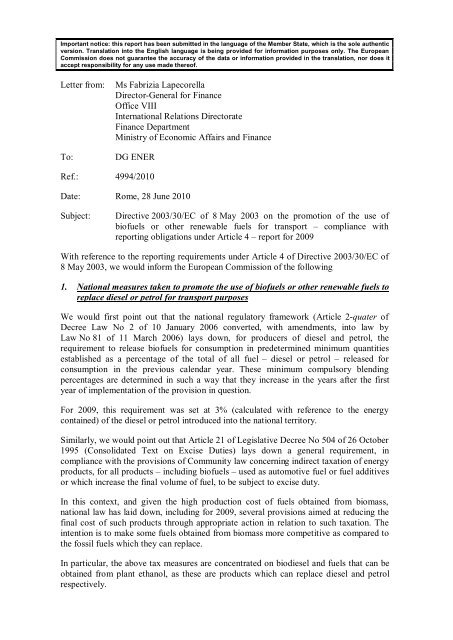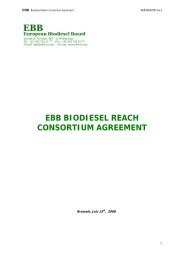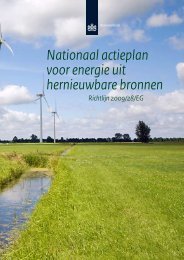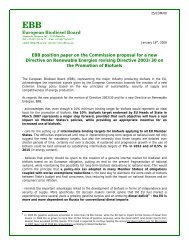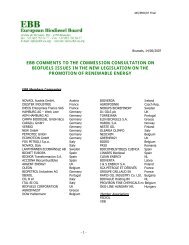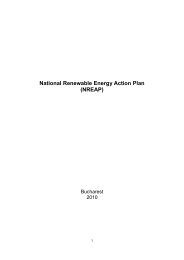Letter from: Ms Fabrizia Lapecorella Director-General for Finance ...
Letter from: Ms Fabrizia Lapecorella Director-General for Finance ...
Letter from: Ms Fabrizia Lapecorella Director-General for Finance ...
You also want an ePaper? Increase the reach of your titles
YUMPU automatically turns print PDFs into web optimized ePapers that Google loves.
Important notice: this report has been submitted in the language of the Member State, which is the sole authenticversion. Translation into the English language is being provided <strong>for</strong> in<strong>for</strong>mation purposes only. The EuropeanCommission does not guarantee the accuracy of the data or in<strong>for</strong>mation provided in the translation, nor does itaccept responsibility <strong>for</strong> any use made thereof.<strong>Letter</strong> <strong>from</strong>:To:<strong>Ms</strong> <strong>Fabrizia</strong> <strong>Lapecorella</strong><strong>Director</strong>-<strong>General</strong> <strong>for</strong> <strong>Finance</strong>Office VIIIInternational Relations <strong>Director</strong>ate<strong>Finance</strong> DepartmentMinistry of Economic Affairs and <strong>Finance</strong>DG ENERRef.: 4994/2010Date: Rome, 28 June 2010Subject:Directive 2003/30/EC of 8 May 2003 on the promotion of the use ofbiofuels or other renewable fuels <strong>for</strong> transport – compliance withreporting obligations under Article 4 – report <strong>for</strong> 2009With reference to the reporting requirements under Article 4 of Directive 2003/30/EC of8 May 2003, we would in<strong>for</strong>m the European Commission of the following1. National measures taken to promote the use of biofuels or other renewable fuels toreplace diesel or petrol <strong>for</strong> transport purposesWe would first point out that the national regulatory framework (Article 2-quater ofDecree Law No 2 of 10 January 2006 converted, with amendments, into law byLaw No 81 of 11 March 2006) lays down, <strong>for</strong> producers of diesel and petrol, therequirement to release biofuels <strong>for</strong> consumption in predetermined minimum quantitiesestablished as a percentage of the total of all fuel – diesel or petrol – released <strong>for</strong>consumption in the previous calendar year. These minimum compulsory blendingpercentages are determined in such a way that they increase in the years after the firstyear of implementation of the provision in question.For 2009, this requirement was set at 3% (calculated with reference to the energycontained) of the diesel or petrol introduced into the national territory.Similarly, we would point out that Article 21 of Legislative Decree No 504 of 26 October1995 (Consolidated Text on Excise Duties) lays down a general requirement, incompliance with the provisions of Community law concerning indirect taxation of energyproducts, <strong>for</strong> all products – including biofuels – used as automotive fuel or fuel additivesor which increase the final volume of fuel, to be subject to excise duty.In this context, and given the high production cost of fuels obtained <strong>from</strong> biomass,national law has laid down, including <strong>for</strong> 2009, several provisions aimed at reducing thefinal cost of such products through appropriate action in relation to such taxation. Theintention is to make some fuels obtained <strong>from</strong> biomass more competitive as compared tothe fossil fuels which they can replace.In particular, the above tax measures are concentrated on biodiesel and fuels that can beobtained <strong>from</strong> plant ethanol, as these are products which can replace diesel and petrolrespectively.
In this context, the following provisions were in <strong>for</strong>ce in 2009:• Article 22-bis(1)-(4) of Legislative Decree No 504 of 26 October 1995(Consolidated Text on Excise Duties) providing, in the framework of afour-year programme (1 January 2007 to 31 December 2010), <strong>for</strong> a rate ofexcise duty reduced to 20% [of that applicable to diesel] to apply to biodieselwithin an annual quota of 250 000 tonnes (the level of the reduction may berecalculated in view of the relative costs of diesel and biodiesel);• Article 22-bis(5), (5-bis) and (5-ter) of the Consolidated Text on Excise Dutiesproviding, within the framework of a three-year incentivisation programme,<strong>for</strong> reduced rates of excise duty on specified fuels and additives (ETBE)obtained <strong>from</strong> plant ethanol.For the purposes of comparison, it should be noted that, during the period underexamination, the excise duty rate in <strong>for</strong>ce in Italy <strong>for</strong> diesel used as fuel was €423.00 per1 000 litres. For petrol used as fuel, the excise duty rate in 2009 was €564.00 per 1 000litres.2. Transport fuels and proportion of biofuels, whether pure or blended, and otherrenewable fuels placed on the marketIn 2009, 10 592 000 tonnes of petrol <strong>for</strong> fuel use (including 183 000 tones of ETBE inblends) and 25 418 000 tonnes of diesel <strong>for</strong> fuel use (including 1 187 000 of biodiesel inblends) were sold in Italy.As <strong>for</strong> total biofuels, 2009 saw 1 187 000 tonnes of biodiesel released <strong>for</strong> consumption inItaly. Also during the year, a total of 183 000 tonnes of biofuels obtained <strong>from</strong> plantethanol (ETBE) blended with petrol were released <strong>for</strong> consumption.Accordingly, the relationship between biofuels and fossil fuels (petrol and diesel) in 2009was around 3.95% in terms of weight. In terms of energy potential, the biofuels released<strong>for</strong> consumption in Italy during the reference period accounted <strong>for</strong> around 3.47% of thetotal quantity of petrol and diesel.3. The national resources allocated to the production of biomass <strong>for</strong> energy usesother than transportNo national resources were allocated to the production of biomass <strong>for</strong> energy uses otherthan transport.4. Exceptional conditions in the supply of crude oil or oil products that have affectedthe marketing of biofuels and other renewable fuelsThere are no exceptional conditions in the supply of crude oil or oil products that haveaffected the marketing of biofuels and other renewable fuels within the meaning of thesecond sentence of the third indent of Article 4(1) of Directive 2003/30/EC.5. National indicative targets under Article 3 of Directive 2003/30/ECLegislative Decree No 128 of 12 July 2005 transposing Directive 2003/30/EC initiallylaid down (Article 3) as the national indicative target (to be fully met by 31 December2010), replacement of diesel and petrol with biofuels and other renewable fuels to thetune of 2.5% (expressed in terms of the energy content of the fuels). As <strong>for</strong> the nationaltargets <strong>for</strong> the ‘second phase’ (second sub-paragraph of Article 4(1) of Directive
2003/30/EC), we would point out that, with effect <strong>from</strong> 1 January 2007, thea<strong>for</strong>ementioned Legislative Decree No 128/2005 was significantly amended, particularlyas regards the national indicative targets <strong>for</strong> replacing fuels with biofuels. Article 3 ofthis Legislative Decree now refers to a national indicative replacement target of 5.75%by 31 December 2010.


